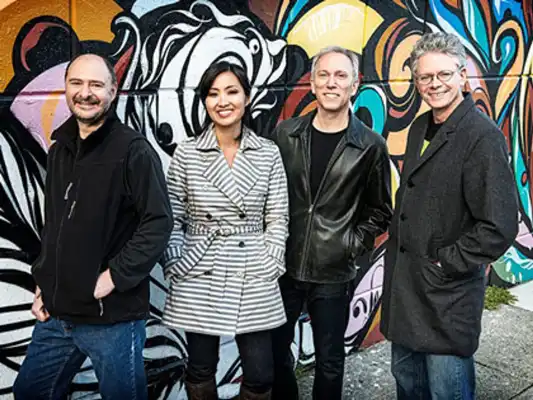Kronos Quartet
Kronos’ adventurous approach dates back to the ensemble’s origins. In 1973, David Harrington was inspired to form Kronos after hearing George Crumb’s Black Angels, a highly unorthodox, Vietnam War–inspired work featuring bowed water glasses, spoken word passages, and electronic effects. Kronos then began building a compellingly eclectic repertoire for string quartet, performing and recording works by 20th-century masters (Bartók, Webern, Schnittke), contemporary composers (Sahba Aminikia, Nicole Lizée, Vladimir Martynov, Aleksandra Vrebalov), jazz legends (Charles Mingus, Maria Schneider, Thelonious Monk), rock artists (Jimi Hendrix, The Who’s Pete Townshend, Sigur Rós), and artists who truly defy genre (multi-disciplinary artists Laurie Anderson and Trevor Paglen, spoken-word poets from Youth Speaks).
Integral to Kronos’ work is a series of long-running, in-depth collaborations with many of the world’s foremost composers. One of the quartet’s most frequent composer-collaborators is “Father of Minimalism” Terry Riley, whose work with Kronos includes Salome Dances for Peace (1985–86); Sun Rings (2002), a NASA-commissioned multimedia ode to the earth and its people that features celestial sounds and images from space; and The Serquent Risadome, premiered during Kronos’ 40th Anniversary Celebration at Carnegie Hall in 2014. In 2015, Kronos’ longtime label Nonesuch Records released One Earth, One People, One Love: Kronos Plays Terry Riley, a five-disc, four-album box set dedicated to Riley that included the new release Sunrise of the Planetary Dream Collector: Music of Terry Riley. Kronos commissioned and recorded the three string quartets of Polish composer Henryk Górecki, with whom the group worked for more than 25 years. The quartet has also collaborated extensively with composers such as Philip Glass, recording an album of his string quartets in 1995 and premiering String Quartets No. 6 in 2013 and No. 7 in 2014; Azerbaijan’s Franghiz Ali-Zadeh, whose works are featured on the full-length 2005 release Mugam Sayagi; Steve Reich, of whose work Kronos has recorded the Grammy-winning composition Different Trains (1989), Triple Quartet (2001), and WTC 9/11 (2011); among many other composers and arrangers.
The quartet spends five months of each year on tour, appearing in concert halls, clubs, and festivals around the world including Carnegie Hall, Disney Hall, Barbican in London, BAM Next Wave Festival, Big Ears, The Arts Center at New York University Abu Dhabi, Palacio de Bellas Artes in Mexico City, WOMAD, Amsterdam’s Concertgebouw, Shanghai Concert Hall, Lincoln Center Out of Doors, Sydney Opera House, Victoria Hall in Geneva, Switzerland, and Haydn Hall in Schloss Esterhazy.
Kronos’ work has been featured prominently in a number of films, including the Academy Award–nominated documentaries How to Survive a Plague (2012) and Dirty Wars (2013), for which Kronos’ David Harrington served as Music Supervisor. Kronos also recorded complete film scores by Philip Glass for Dracula, a 1999 restored edition of the 1931 Tod Browning-directed Bela Lugosi classic; Clint Mansell for the Darren Aronofsky films The Fountain (2006) and Requiem for a Dream (2000); Terry Riley for François Girard’s Hochelaga terre des âmes (2017); and Jacob Garchik for Guy Maddin’s The Green Fog (2017). Additional films featuring Kronos’ music include Mishima: A Life in Four Chapters (1985), La grande bellezza (The Great Beauty) (2013), 21 Grams (2003), Heat (1995), and True Stories (1986), among others. A Thousand Thoughts: A live documentary with the Kronos Quartet, written and directed by Sam Green and Joe Bini, features live narration by Green and live music by Kronos. It premiered in 2018 at the Sundance Film Festival and Wexner Center for the Arts at The Ohio State University.

- Website: https://kronosquartet.org/